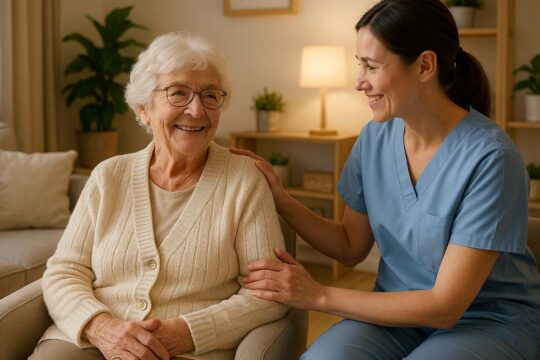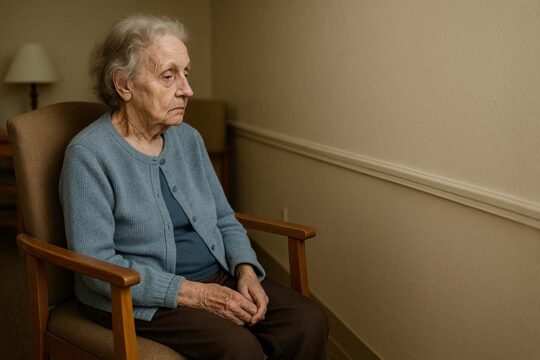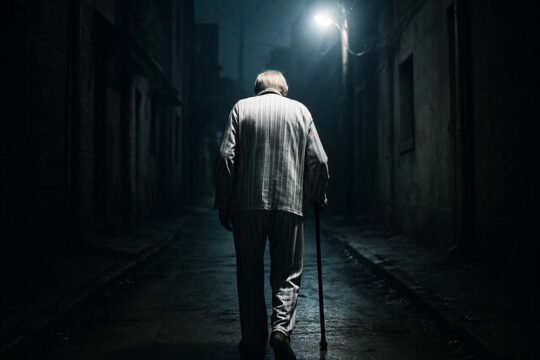
Why Do Elderly People Feel Cold All the Time?
Why Do Elderly People Always Feel Cold?
As people age, their bodies undergo various changes that can make them feel colder, even in moderately cool environments. Exploring causes and how various health issues contribute to the feeling of cold in the elderly, sets the stage for a deeper understanding of the symptoms and management strategies needed to maintain comfort and health while ensuring safety for seniors.
Common Causes for Seniors Feeling Cold
Common causes of seniors feeling cold often stem from medical conditions that affect the body’s ability to regulate temperature.
- Anemia
This condition occurs when the body doesn’t have enough healthy red blood cells to carry adequate oxygen to tissues, leading to chronic cold feelings, particularly in the extremities.
- Cardiovascular Disease
Impaired circulation caused by cardiovascular issues means less blood flow, especially to the hands and feet, resulting in a colder sensation throughout the body.
- Diabetes
This metabolic disorder can lead to peripheral artery disease and neuropathy, which can decrease blood flow
- Kidney Disease
Kidney disorders can affect the body’s ability to regulate various physiological processes, including temperature, due to hormonal imbalances and reduced kidney function.
- Thyroid Disorders
Hypothyroidism, a common thyroid disorder among the elderly, slows down the body’s metabolism, which can decrease the generation of body heat, making an individual feel perpetually cold.
- Medications
Certain medications, such as beta-blockers and some antipsychotic drugs, can decrease heart rate or impact circulation, subsequently reducing blood flow to the skin and increasing cold sensitivity.
- Strokes
A stroke can disrupt the part of the brain regulating body temperature, causing seniors to feel unusually cold or unable to sense temperature correctly.
- Parkinson’s disease
Parkinson’s affects the autonomic nervous system, which controls body temperature regulation, leading to feeling cold.
- Nerve damage
Damage to nerves, especially peripheral nerves, can reduce sensation in the limbs, making it hard to perceive warmth.
- Sepsis
Sepsis can lead to a drastic drop in body temperature as the body’s immune system response disrupts its ability to regulate heat. - Anorexia or malnutrition
Both conditions can lead to a lack of sufficient body fat and decreased metabolism, which are needed to maintain warmth. - Alcohol or drug use
Alcohol and certain drugs can dilate blood vessels, increasing heat loss from the skin’s surface, and causing seniors who drink or use drugs to feel colder. - Anesthesia
Post-operative effects of anesthesia can interfere with the body’s thermoregulatory mechanisms, causing patients to feel cold.
Symptoms of Cold Sensitivity in the Elderly
Cold sensitivity in the elderly can manifest through various symptoms that highlight their increased vulnerability to lower temperatures. These may include frequent shivering, which is the body’s attempt to generate heat through muscle activity. Elderly people might experience numbness or pallor in their extremities, especially in their fingers and toes, because blood flow is restricted to conserve heat for vital organs. There can also be an exacerbation of joint pain or stiffness, often worsened by cold weather. Other symptoms like lethargy or fatigue could indicate that the body is struggling to maintain its core temperature. Recognizing these signs is important in order to provide timely and appropriate care to maintain comfort and health for elderly people during colder months.
How does aging affect the body's thermoregulation?
As people age, physiological changes occur that affect the body’s ability to regulate temperature, leading to increased cold sensitivity. One of the primary factors is the decrease in basal metabolic rate associated with aging. This reduction means the body generates less heat during rest, making it harder to maintain a warm body temperature. Aging skin becomes thinner and has less subcutaneous fat, which diminishes its insulation and slows down the skin’s response to cold.
Elderly people also experience a decrease in blood circulation. With age, blood vessels lose some of their elasticity, and the heart’s efficiency can decline, reducing the flow of warm blood to the extremities. This reduction in circulation makes it difficult for the body to respond quickly to changes in temperature.
Treatment for Cold Sensitivity in Seniors
Treating cold sensitivity in seniors involves addressing the underlying causes and providing supportive care to manage symptoms. A thorough medical assessment is needed to identify and treat any underlying health issues, such as anemia, thyroid disorders, or cardiovascular diseases, which might be contributing to cold sensitivity. If medications are found to be a contributing factor, a doctor may adjust the dosage or switch to a different medication to alleviate symptoms without compromising the treatment of the primary condition. In cases of thyroid disorders, appropriate levels of iodine in the diet are important. Ensuring a diet rich in iron, vitamins, and minerals can help combat anemia and support overall body health, potentially reducing symptoms of cold sensitivity.
Wearing layers of warm, breathable clothing can help maintain body heat and manage the discomfort associated with feeling cold. Thermal wear can sometimes be effective. Keeping their living environment warm using adequate heating systems or heated blankets and pads can provide immediate relief from the cold.
Regular, physical activity or gentle exercise can improve circulation and help increase body temperature, reducing feelings of cold. Consistent monitoring and effective management of chronic conditions like diabetes and kidney disease can help improve overall health and mitigate symptoms like cold sensitivity.
These treatment strategies are aimed at providing relief from the symptoms and improving the senior’s overall quality of life by addressing the root causes of their cold sensitivity.
What role does nutrition play in managing cold sensitivity among seniors?
Nutrition could be part of managing cold sensitivity among seniors, mainly by ensuring their bodies have the right resources to generate heat and maintain a healthy metabolism. Adequate intake of vitamins and minerals, especially those that support thyroid function and blood health, can affect how the body regulates temperature including:
- Iron: An essential component of hemoglobin, iron helps carry oxygen in the blood. Iron-rich foods like spinach, red meat, and fortified cereals can help combat anemia, a common cause of feeling cold.
- Vitamin B12: This vitamin is vital for producing red blood cells and can be found in animal products like meat, dairy, and eggs. A B12 deficiency might lead to decreased blood flow and a feeling of cold.
- Iodine: Important for thyroid health, iodine influences the body’s metabolic rate. Foods like seaweed, fish, and dairy are good sources of iodine. Ensuring sufficient iodine intake supports thyroid function, helping to regulate body temperature.
- Fatty Acids: Omega-3 fatty acids, found in fish like salmon and sardines, can improve blood circulation, which might help in keeping the extremities warm.
By maintaining a balanced diet including these nutrients, the elderly can enhance their body’s ability to maintain core temperature and reduce cold sensitivity. Regular dietary assessments by healthcare providers can ensure that seniors receive the nutrition they need to manage this condition effectively.
Dangers of cold intolerance in the elderly
Seniors who feel cold could be at risk of hypothermia. Hypothermia occurs when your body loses heat faster than it can produce it, causing your body temperature to fall below 95 degrees. This condition can be dangerous and life-threatening if not promptly treated. Signs of hypothermia in the elderly may include disorientation, confusion, shivering, slurred speech, feeling drowsy, slow or shallow breathing, weak pulse, or loss of consciousness. Hypothermia can lead to severe complications, including heart and respiratory failure, and ultimately death if severe and untreated. It’s important to effectively manage and treat cold sensitivity in elderly people.
Discover the key differences between retirement homes and assisted living to help you choose the right care for your loved one’s needs.
Learn the risks of leaving a dementia patient alone, legal responsibilities, care strategies, and how to plan for their safety.
Learn why dementia patients wander at night, how to prevent it, and when memory care is the safest option for your loved one in San Diego.
Compare memory care and assisted living, from services and costs to safety and staffing, to find the right senior care in San Diego.



